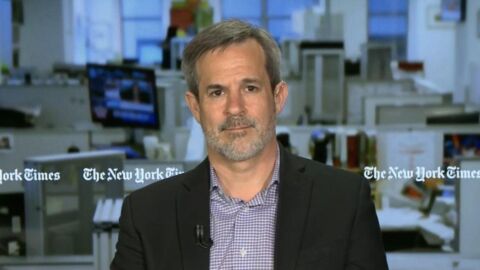Read Transcript EXPAND
CHRISTIANE AMANPOUR: But first, let us take a step back and dig deep into what’s dividing America. Republican Strategist, Frank Luntz, has been a gauging the nation’s political polarization for decades. Once described as the Nostradamus of pollsters, he is best known for pioneering political focus groups. He says these conversations are a painful wakeup call now to the toxicity of the red versus blue rhetoric. He tells our Walter Isaacson that he’s given up hope of a really united America.
WALTER ISAACSON: Frank, thank you so much for being with us.
FRANK LUNTZ, REPUBLICAN STRATEGIST: Thank you.
ISAACSON: Why are we so polarized now?
LUNTZ: It’s because we speak to be heard rather than speaking to learn or listening to learn. I think that for so many people for so long they had no voice, that the elites, people like you and me, we had a place where we could put out our information, television, newspapers, media, anywhere, but there’s — the vast majority of Americans wanted to be heard, they were frustrated, they felt forgotten and left behind. And with the current political environment, they now have the chance to be heard. The problem is we’re not learning anything, we’re not growing, we’re not seeing life in all the its greatness. All we are doing is finding ways to demonize each other or worse, to humanize each other or to be the worst of all, which is to denounce each other, the D words, and we’re all doing it, on the right, on the left, in the media, in culture and entertainment. Any time you put a camera in front of you, watch the language that’s being used and it is so ugly and so polarizing. And I’ll tell you now because you and I have known each other for a while, not only has it never been this bad, but the America that you knew and the America that you celebrate in and the great books that you wrote and — of these great people, that’s not the country we are right now. And it’s not — it is not that we’re heading in that direction, Walter, I’m telling you, we’re here. If you heard what I hear, if you went to these sessions that I moderates and listen to people unedited, unfettered, it makes you want to cry.
ISAACSON: You watch people just erupt against each other. In fact, can we show a clip.
LUNTZ: Right.
ISAACSON: Yes, let’s go.
(BEGIN VIDEO CLIP)
UNIDENTIFIED MALE: Right. There’s no problem.
UNIDENTIFIED MALE: No, it’s not.
UNIDENTIFIED MALE: Right — no. Right there. Your attitude is the problem.
UNIDENTIFIED MALE: My attitude?
UNIDENTIFIED MALE: Yes.
UNIDENTIFIED MALE: I don’t want somebody telling me that my schools have to have prayer in schools.
UNIDENTIFIED MALE: Correct.
UNIDENTIFIED MALE: I did not say that.
UNIDENTIFIED MALE: They did not before.
UNIDENTIFIED MALE: They did not.
UNIDENTIFIED MALE: All I said was prayer in school. All I said was God chooses the color of our skin. That’s all I said. Now, if you don’t believe that —
UNIDENTIFIED MALE: What if you don’t believe —
UNIDENTIFIED MALE: — then who’s making the choice?
UNIDENTIFIED MALE: What if you don’t believe in God?
UNIDENTIFIED MALE: Who’s making the calls?
(CROSSTALK)
UNIDENTIFIED MALE: You should because you’re trying to enforce it on everybody else.
UNIDENTIFIED MALE: There you go.
UNIDENTIFIED MALE: You’re making a lot of gross assumptions.
UNIDENTIFIED MALE: I’m not making —
UNIDENTIFIED MALE: Gross assumptions. You are making –
(CROSSTALK)
UNIDENTIFIED MALE: I’m looking at my spans who signed anti-LGBT in Indiana. So what?
UNIDENTIFIED MALE: I rest my case. It all comes down to listening and look at what the other person has to say. Open up your ears and not your mouth and listen to what other people have to say. Then weigh what’s going on. They call liars. They all lie.
UNIDENTIFIED MALE: What do you think — OK, then what do you think —
UNIDENTIFIED MALE: Everybody says about you being progressive and brutal and all this stuff but you support — how condescending was Obama? I can’t stand to watch that guy. He just looked down on top of everybody. Trump will get down in the dirt and work with you. Obama had never done that.
UNIDENTIFIED MALE: So you want respect but you have a president who takes on women, minorities, everything but —
UNIDENTIFIED MALE: And you know why he won the election? And he won and you guys can’t handle that.
(END VIDEO CLIP)
LUNTZ: Stop — my parents — when I was a kid, I used to hear in Hebrew school sheket bevakashah which is basically, shut up and listen, don’t disrupt the class. You saw that. You saw the anger. And those aren’t kids. Those aren’t young adults. They’re people older than us. These are people in their 70s. And if they behave that way, then don’t you think that people in their 40s are going to follow them, and people in their teens are going to follow those? My God.
ISAACSON: But do you think that focus groups and the micro-targeting and whatever have helped, and you have been in the lead of that, have helped polarize our society?
LUNTZ: The purpose of the focus group is to bring attention to what people think and feel. It’s to give them a voice for three hours and then put them on television. I know you’ve got another one there and the one you’re about to pull up is one of the coolest of all.
(BEGIN VIDEO CLIP)
UNIDENTIFIED FEMALE: I respect everybody’s point of view. But not to get into arguments, I usually like to stay with people who have more or less the same point of view as I do.
LUNTZ: Is that healthy, though?
UNIDENTIFIED FEMALE: Yes. In 2018, it is because any time I disagree with somebody, I notice they make enemies with me. They don’t talk to me anymore. It’s not me not talking to them.
(END VIDEO CLIP)
LUNTZ: That’s a first generation — that whole group were first-generation immigrants from countries all across the globe. And they were the most hopeful and they were the most optimistic. And they — if they were right here right now, and I’d love to bring their opinions to your viewers, they would tell you that America is still a great country. That America still offers the opportunity and the hope and the dreams of change and improvement, of making a better life. That is still there. And they would criticize all the meanness and bitterness that people have. But you only get that from an outsider. You don’t get that, if this is how you’ve grown up, you compare the way we are today to the way we were 20 or 30 years ago. So to finish your point, it’s a fair point. I thought that the purpose of these focus groups and sessions was to explain the anger, was to explain the frustration. What it ended up doing, unfortunately, tragically, is feeding it. When these people behaving that way on television, they start to behave that way themselves and I hate that.
ISAACSON: What about the media and the filter bubble we have where we’re going to our corner of the blogosphere or our end of the talk radio dialer or a cable news channel?
LUNTZ: So in the studies that I’ve done, I’ve realized this is really tragic that we now get our news to affirm us rather than inform us. If you tell me you read “The Wall Street Journal” first, I’m going to assume that you’re on the right side of the spectrum. If you read “The New York Times” first, I’m going to assume you’re on the left side. And I’m going to be right 70 or 75 percent of the time. There are liberals who read “The Journal”. There are Conservatives who read “The Times”. But we’re not crossing paths anymore. We’re not collecting the same information anymore. CNN, very few Republicans watch CNN. Very few Democrats watch “Fox”. It shouldn’t be that way. And the more polarized our media, the more likely that the public itself becomes more polarized.
ISAACSON: Do you think perhaps this polarized discourse is because the stakes are very high and there is a reason people are mad?
LUNTZ: That’s the excuse I’ve gotten but we’ve always had a way. Look, we had this in, say 1848 to 1859 and we know what happened in this country and so many people died. We had the same thing globally in 1936 to 1939. They didn’t figure it out and tens of millions of people died. The stakes are no less high now than they were in 1816 and they were in 1939. And I know how it works out, because I read too much, because I learn too much. I know what happens. I’ve read the end of the book. When you read the end of 1984, what has he done? He’s given up. That’s how he lived. He gave up. I don’t know — I wasn’t raised — I don’t know any other way but to fight it and I’m so tired now. Come with me. Just come to these groups, listen to Americans, and it’s painful now. It really is.
ISAACSON: But you know, we came through 1939. We came through 1968.
LUNTZ: Your family —
ISAACSON: We came through the Civil War.
LUNTZ: Your family — Bobby Kennedy did not. Martin Luther King did not. How many people were killed in 1968? It was the worst year of our time. And I think 2020 could be 1968 all over Again.
ISAACSON: But America’s political system has always so far had a gyroscope —
LUNTZ: So far.
ISAACSON: — and righted itself.
LUNTZ: Is Britain still the great power it was? Is France still the great power? Portugal used to have the most incredible Navy. It’s meaningless today with all due respect to the Portuguese. Russia had this most amazing empire that’s come and gone. How many empires, the Egyptians, the Romans, how many empires have come and gone? And I really don’t want to be around to see the end of mine.
ISAACSON: You talk about some of the really tough times. And one of the things that happened in each time was the emergence of a new movement. Sometimes a new party. Sometimes, whether it be Teddy Roosevelt or Abraham Lincoln or in some ways a new deal coalition comes on. Do you think there can be a realignment or even a third-party in American politics that says we’re about to go off a cliff, let’s get sensible?
LUNTZ: You just described Howard Schultz. This is a guy who grew up in abject poverty, who grew up hungry. You’d think he’d be a hero of the Democratic Party, that he struggled, he succeeded, and then he gave that success to others. He gave his people health care long before Walmart ever did. He gave his people the ability to buy into the company long before most Wall Street companies ever did. He’s now providing an education benefit before anyone is. He gave back and he was decimated by them. How are you supposed to challenge this when the very people who should be applauding your success are the ones yelling at you. In America, it was never evil to be successful as long as you gave back to your community. And now you have kids who scream and protest at him, “You billionaire, go back to Davos.” This man has done more for the people who work for him than any other employer. And he is a billionaire and he’s successful and he has given back. And yet he is screamed at wherever he goes, he’s protested. Now, I have no faith because someone like that should have that capability. There are people in the Democratic Party, Mitch Landrieu, one of the best mayors ever in this country. I’m praying that he runs for office because, at the same token, he takes on the Confederate Statues because they are offensive. And he says to the Teachers Unions, you have failed our education system when they turned into charter schools. People like Michael Bennet who’s — I don’t know whether he runs. He’s willing to challenge the president’s budget, Obama’s budget because he configured too much of the deficit to the debt at the very moment that he’s chairman of the Democratic Senatorial Campaign Committee. These are the people with guts. Tim Scott from South Carolina who has a heart as big as this entire studio. And cannot say a negative word because he thinks it’s wrong. It is not just part of him, but it’s not who he believes we should be. Or Ben Sasse who has an intellectual approach. There are amazing people out there. But I think the system will break all of them.
ISAACSON: But let me ask you, suppose you had a pragmatic Democrat, one who said, I’m going to try to work and get things done. Take Mitch Landrieu, take Michael Bennett, two you’ve mentioned. How would you have them run? Could they possibly win?
LUNTZ: We actually had one. His name is John McCain and he wanted to choose Joe Lieberman. What an amazing thing that would have been, McCain- Lieberman. And you know what happened. You may even have written about what happened. McCain was destroyed. They told him it will block your nomination if you do this. But we were even more hyped up. We were even more partisan today. And you can’t wish — I wish for them to have the courage of their convictions, but I do not wish them to destroy their lives. It’s not right for us to push them into that.
ISAACSON: You’ve been so pessimistic. First of all, why don’t you then just walk away from it all? Or secondly, could you find a new purpose in how you could direct your political talent to do something different?
LUNTZ: I have a purpose and it is the next generation. I’m teaching at NYU Abu Dhabi. Not NYU, but NYU Abu Dhabi, the most global campus on the face of the earth. I’m taking 17 students on a 10-day trip to London, Paris, and Brussels at the exact moment of Brexit. Last year, I took them to San Francisco, Los Angeles, Washington, and New York and introduced them to conflicts in America. The only hope that I have, the reason why I do keep going is because that campus is the most global on the face of the earth. And every day they solve problems. Every day they address conflicts. The Russian student’s best friend is Ukrainian and they’re roommates. You have Jewish students who have close relationships with Palestinians and other Arabs. You have Chinese students who are close, incredible friends with countries that they have invaded in my lifetime. That’s the solution. Our only hope, our only hope is that we teach children to love, not hate. Is that we teach them not tolerance, because that’s the lowest level, that we teach them respect and civility and decency. And that we do it not just in America but on a global scale. If we can wring out this hate in that generation, this world survives and America prospers.
ISAACSON: Frank, thank you for being with us.
LUNTZ: I apologize but thank you for having me.
ISAACSON: Thank you.
About This Episode EXPAND
Russian Senator Konstantin Kosachev shares Moscow’s reaction to the Mueller investigation’s findings. Janet Napolitano on whether America’s 2020 elections will be secure. And Jonathan Weisman, author of “(((Semitism))): Being Jewish in the Age of Trump,” on the the partisan rift over US-Israel ties. Republican strategist Frank Luntz joins Walter Isaacson to discuss America’s toxic politics.
LEARN MORE



